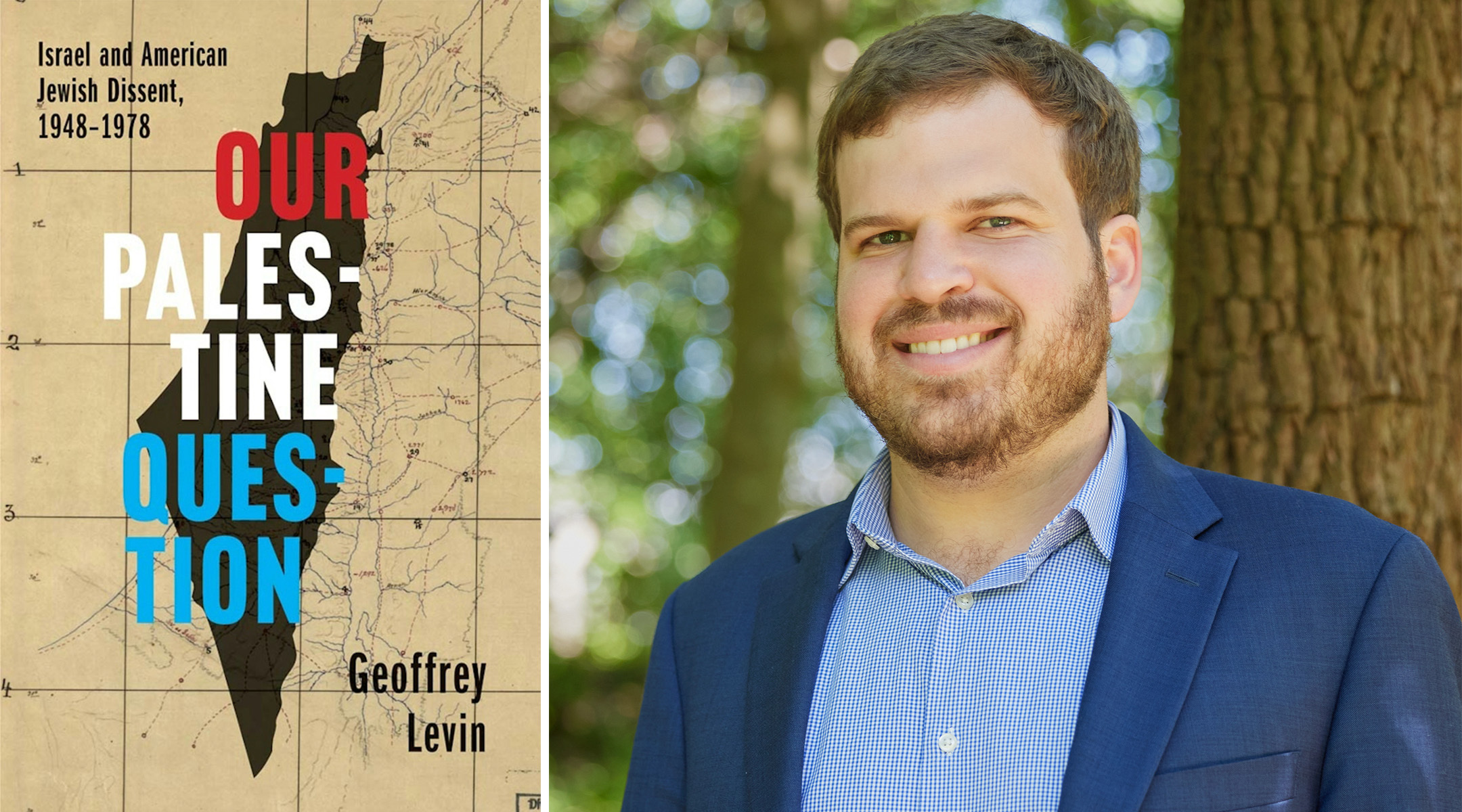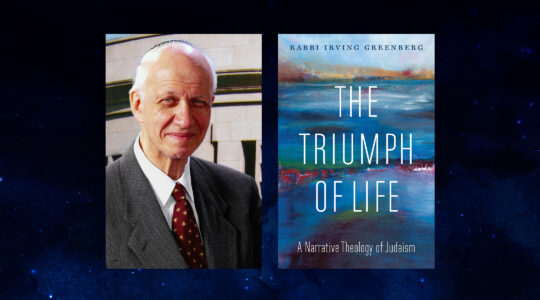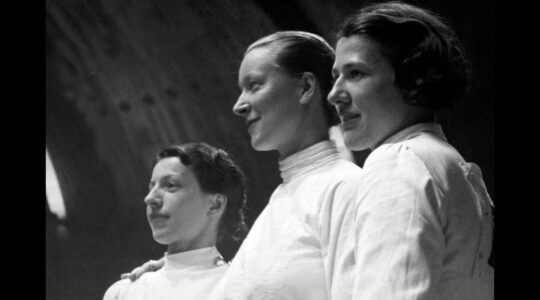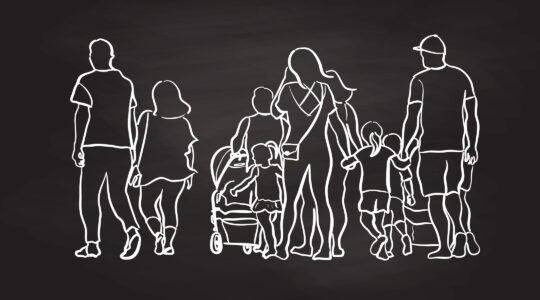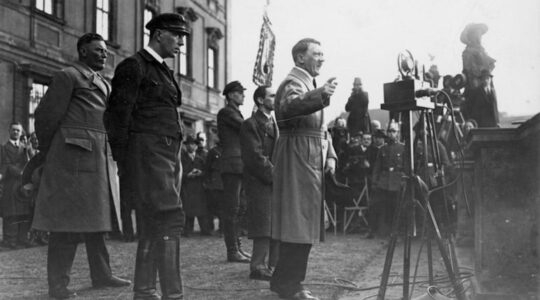(JTA) — In the four months since the Hamas attacks on Israel touched off war in Gaza, Jewish protesters have joined demonstrations in the streets of New York, San Francisco and other cities condemning Israel and demanding an immediate ceasefire.
But Jewish calls for a ceasefire haven’t only come from the far-left Jewish groups that often lead the rallies. In December, hundreds of staffers for 140 mainly progressive Jewish organizations signed a letter urging President Biden to press Israel for a ceasefire. Other Jewish leaders, including hundreds of rabbis, pushed back, signing a letter saying, “There is not broad support within the Jewish community for a ceasefire. Not now.”
These kinds of intra-communal clashes have been a signature of the Israel-Hamas war, leading to think pieces that talk of unprecedented divides within the Jewish community and of a generation of young Jews who reject what they say is a reflexively pro-Israel stance by the Jewish mainstream that doesn’t take Palestinian lives into consideration.
These divides are particularly stark, says the historian Geoffrey Levin, but they are not unprecedented. In his new book, “Our Palestine Question: Israel and American Jewish Dissent, 1948-1978,” he writes about an early, formative era before American Jewish institutions had unequivocally embraced Zionism, and when American Jewish leaders disagreed with the Israeli government over the fate of the 750,000 Palestinians displaced by Israel’s war for independence.
Many of these voices of dissent have been overlooked over the years — decades in which the largest Jewish organizations hesitated to show any daylight between their policies and Israel’s, especially on security affairs. Levin found them in the archives of the American Jewish Committee and other organizations. Documents and interviews revealed untold or mischaracterized stories of groups and individuals who were deeply concerned about the displaced Palestinians and were calling for solutions, from a binational state to two states to a “right of return,” that were being soundly rejected by Israel.
He also writes about the ways these dissenters were sidelined, whether by an American Jewish establishment that came to see its priorities and Israel’s as one and the same, by acts of Palestinian terror that shook the Diaspora to its core, or by Israeli efforts to “manage” American Jewish dissent.
“This generation is not the first American Jewish generation to think about Palestinians,” Levin told me. “This goes back to as long as there’s been the refugee issue. There have been Jews who went over there and saw things and felt like it didn’t fit with their American liberal or left-wing Jewish vision.”
Levin is assistant professor of Middle Eastern and Jewish studies at Emory University. He grew up in a “typical Reform” Jewish home outside Chicago, was president of the Hillel at Michigan State University and earned his PhD in Hebrew and Judaic Studies/History from New York University in 2019.
We spoke Thursday about Jewish attitudes toward Zionism, key moments in Jewish advocacy for Palestinian rights and how the communal struggles of the near past shed light on the present.
Our interview was edited for length and clarity.
Your book arrives among a spate of books dealing with the history of Jewish dissent over Israel and Zionism, including “The Threshold of Dissent,” by Marjorie N. Feld, “American Jews and the Movement for Justice in Palestine” by Oren Kroll-Zeldin, and “The Necessity of Exile” by Shaul Magid. Obviously they were researched and written well before Oct. 7. Have you thought about why this topic is getting so much interest in recent years?
We all have different relationships with this. I started my dissertation for what became this book in 2014. I think a lot of it is due to the collapse of the two-state solution, which as long as it was viable kept this ability for something called liberal Zionism to stay together. I also think there’s much more of a willingness within Jewish Studies for this sort of work than there was 15 years ago.
Is that a generational thing?
Partially, but for a lot of people, there is a pendulum in Israeli politics of left and right. For basically my whole adult life — I’m 34 — the right has been in power in Israel. And as Israel is going in this right-wing direction and parts of American Jewry is not, there is a kind of processing that is part of this interest in Jewish advocates of Palestinian rights.
Much of your book centers on the internal struggles of the American Jewish Committee, which you write was considered by Israelis as “the single most politically influential Jewish group in the United Sates in the 1950s.” What readers may not realize, and is a key theme in the book, is that the AJC, like the American Jewish community itself, wasn’t always the pro-Israel juggernaut we know today, but has a much more complicated relationship with Israel. It may not be apparent now, but the Jewish mainstream at this time was still conflicted about supporting a Jewish state, for a variety of reasons.
This doesn’t make sense to a lot of people today, but basically the AJC was saying, “We want to help Israel because there are Jews there, but we don’t ascribe to the more doctrinaire vision of Zionism at the time that requires Jews go back to Israel or views Jews as a nation.”
Don Peretz, second from left, who would later become an American Jewish Committee official studying Arab refugee affairs, in Acre while volunteering to aid displaced Arabs in February 1949. (Courtesy of Deborah Peretz)
Your book includes chapters on the wide variety of American Jewish dissent over Israel, well before the current era. There are American Jews who are ideologically and religiously opposed to Zionism; others who are, let’s say, prematurely pro-Palestinian but were certainly committed to the idea of a Jewish state; and activists who say Jews don’t deserve a state and certainly not in Palestine.
This is a book about people who have all these labels, who are Jewish, who care about Palestinians in a variety of ways and imagine lots of solutions. So there were anti-Zionist Jews in the ’40s and ’50s who didn’t necessarily care about Palestinians, but were anti-Zionist because of the American context and what their idea of Jewish identity is. In the ’50s and ’60s, I show this story about how some people began making the Palestinian rights issue part of their chief reasons for opposing Zionism. There are people like Rabbi Elmer Berger, executive director of the American Council for Judaism [from 1942 to 1955], who comes out of the Reform tradition and a Jewish tradition of anti-nationalism for Jews, and people like Sharon Rose, who calls herself a “nice Jewish girl from New York” and goes to Israel and rejects Zionism because of the Palestinian rights issues, in the 1970s, when it wasn’t a huge movement.
“Our Palestine Question” covers a period in which discussion of Palestinian rights goes from pressing to nearly forbidden, and when talk of a two-state solution will come to be considered outside of the emerging American Jewish mainstream, and won’t emerge again until the Oslo era.
Yes. The scope of my book is from ’48 to ’77. But a lot of it is in the ’50s. There’s a two-year period, ’56 to ’58, where the AJC is flirting with having their own policies and their own discourse about Israel and Palestinian rights [distinct from Israel’s]. This is before America really falls in love with Israel — before “Exodus,” the book and movie, came out in 1958 and 1960 [respectively]. This is before the Six-Day War. Before this, the AJC’s letterhead about Israel actually calls itself non-Zionist, and then it kind of disappears. And so this is the story about how groups like them, which are really focused on American Jews and America more broadly, really take on defending Israel as part of their missions, because until then it wasn’t self-evident that an American Jewish advocacy group would consider that a core part of their mission.
What was the hesitation?
They had to get used to the new idea. They had to get used to Israel existing. They had to adjust to the idea that for the first time Jews are ruling over non-Jews. And so, you know, there’s quiet conversations: What does this mean for us? What does this mean for what it means to be Jewish? What does this mean for our relationship with the U.S. government?
So amid all these crosswinds, the AJC actually creates a subcommittee on the Arab refugee issue. Tell me about Don Peretz, the AJC official who cared deeply about Palestinian refugees and sought solutions in the 1950s in hopes of avoiding what would become an increasingly violent conflict.
So he’s born in 1922. His dad was a Sephardic Jew from Jerusalem who fled during World War I to the United States. The father married an Ashkenazi American Jewish woman, and Don’s born on Halloween of 1922. He gets very interested in pacifism, and while living in Queens he works for some Quaker relief efforts through the American Friends Service Committee. He’s not an ardent Zionist, like his father.
During World War II, Don doesn’t want to hold a gun so he gets trained as an interpreter and serves in Okinawa. I didn’t know that you could do this, but with his GI Bill benefits he goes to Hebrew University for a master’s degree and to connect with the land of his father’s family.
And the other thing that draws him to Hebrew University is its president, Rabbi Judah Magnes, a binationalist who supported a joint Arab-Jewish state.
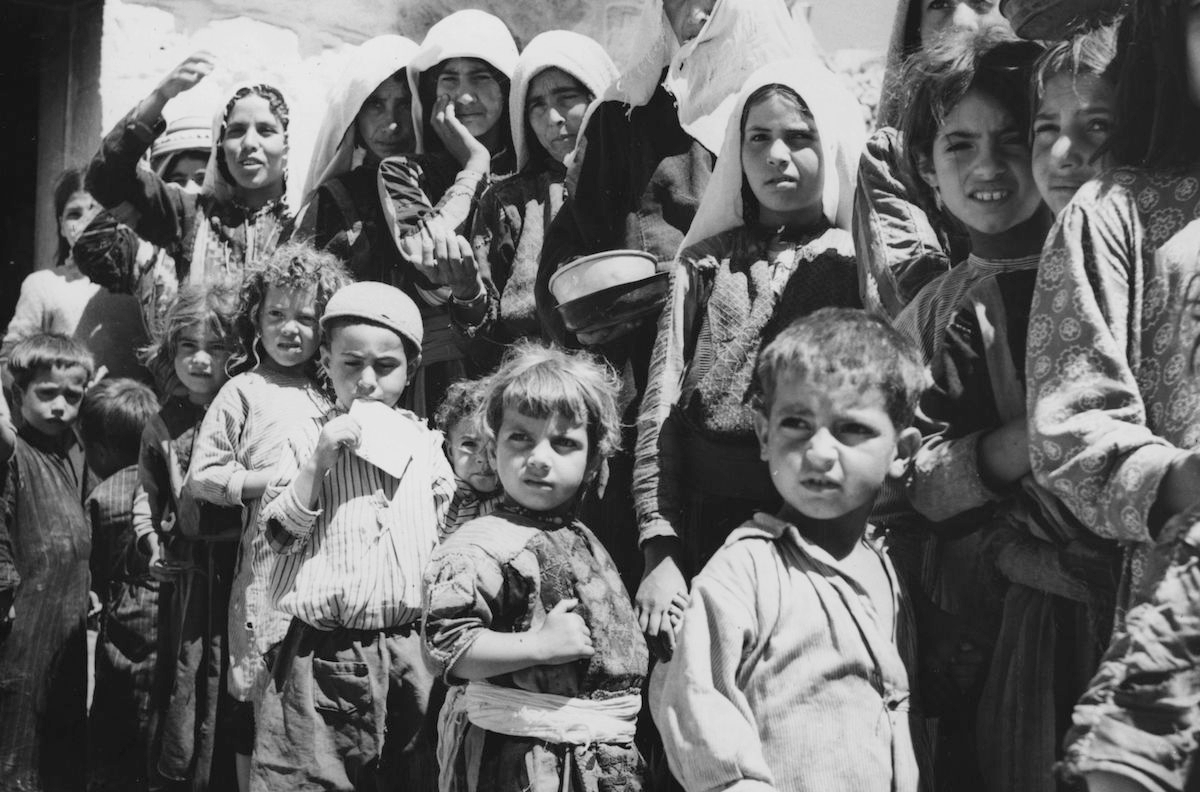
Palestinian refugees line up for food at a camp in Amman, Jordan in 1955. (Three Lions/Getty Images)
Peretz was in what became Israel during the war for independence, but didn’t join the fighting.
He becomes a journalist and somehow gets abducted or arrested by an Arab Palestinian militia in Jerusalem. Eventually they find out he likes Magnes and they let him go, even though he is a Jew.
But the war has soiled a lot of his views about Israel and Zionism.This extreme nationalism sort of disgusts him. He leaves but he comes back when he finds out the Quaker American Friends Service Committee is devoted to helping Palestinian Arabs who are displaced, who were not allowed to return to their villages by the new Israeli government, even though they remained in this new state of Israel. He’s living in Haifa, helping people in the Galilee with food and clothing for some 40,000 people. People want him to stay and the Arabs want him to continue helping but he leaves to earn a PhD at Columbia University. And he completes in 1955 what to my knowledge is the first dissertation anywhere on the question of Israel and the Palestinian Arabs. It’s not meant to really push one way or another but to understand this issue deeply. And he impresses the American Jewish Committee.
And they hire him.
They hire him in 1956 to work on a relief initiative to help Palestinian Arab refugees who are outside of Israel, or in Arab countries. American Christian groups are talking about the Palestinian refugee issue. Arab diplomats are talking about it. A CIA-backed group is talking about it and they [the AJC] feel like they can’t ignore it.
The head of the committee he’s working with is Harold Riegelman, the former Republican mayoral nominee of New York City, a former postmaster general. These are people who have influence. And the leader of the American Jewish Committee, Irving Engel, he’s proud of this idea and announces it in papers like the ones you write for. No one’s upset about it. I couldn’t find anyone attacking it publicly.
But who are upset about it? Israeli diplomats. I got into the primary sources, letters between diplomats in Hebrew, and I found that they didn’t want American Jews to have an independent voice on these issues. They thought the problem would go away if you don’t discuss it. And that’s often been the dynamic: Just don’t discuss these Palestinian-related issues, because by discussing it there might be pressure for some sort of solution that Israel doesn’t like.
The AJC put out a pamphlet on the refugee problem that did not rule out the return of many refugees to their former villages, at a time when this was certainly not the policy of Zionist groups and Israel. Did the Israelis make their displeasure known?
They tried to ruin Don Peretz’s career. They want to get the AJC to fire him. But then the [Suez Crisis] breaks out and people are distracted. The AJC doesn’t fire him, but they said, “Look, we’ll have Israeli diplomats look over everything he writes.” He has this book coming out that will be the first scholarly attempt to objectively look at Israel’s policies toward Palestinians, and the AJC says, “Don, we don’t have the budget for you. It can be part-time,” and he says, “I think I’ll leave.”
He becomes involved in a lot of different efforts later on as an academic and writer. And after leftists like Noam Chomsky take up this issue after‘’67, he’s involved with them. When Breira, the first sort of American Jewish attempt to really push for what we call the two-state solution, emerges, he served like a senior figure, giving them academic credibility.
Let’s talk about Breira, the first national American Jewish organization to advocate for a Palestinian state, and how it was driven out of existence in 1977 by a Jewish mainstream that accused it of being a “front” for the Palestine Liberation Organization. Your book got me thinking about the difference between them and the “ceasefire now” Jewish activists of today who are either anti-Zionist or non-Zionist. The activists in Breira were part of some of the Zionist organizations and institutions that rejected them.
They tried positioning themselves as nice Jewish girls and boys, and some became part of the establishment, like John Ruskay [who would go on to head UJA-Federation of New York], and a lot of them were burned by this experience. A lot of them had spent time in Israel. As I show in my book, they’re trying to say, “Look, we’re just saying what Israelis on the left are saying about Palestinian self-determination and like them we are meeting with PLO moderates.” But that’s not enough to protect them. They get called traitors and all the worst things that you can imagine that really hurt a young American Jew. And the organization falls apart.
This was when it was illegal in Israel to talk to the PLO.
No, it actually wasn’t at that time. It became illegal because of these sorts of meetings.
I remember when, once the Israeli government began talking with the PLO in the early 1990s and supporting some form of autonomy for the Palestinians, talk of a two-state solution became mainstream. Tell me a little bit more about how the discourse around Israel has changed with the fading of the two-state solution.
When I was first involved in Israel stuff on campus, Ehud Olmert was prime minister, but since then there’s been Benjamin Netanyahu, who’s been working against the two-state solution for as long as people who are my age or younger have been engaged with this. I’m old enough that I remember the Second Intifada and Israeli victimhood and the terror of that but people who are younger than me don’t think that’s important.
And you write about the disillusionment among many young Jews today, perhaps especially among the kinds of people who visit Israel and grew up in Zionist homes. You write, “surprise and disillusionment often emerge from real, meaningful exposure.”
My generation, millennials and Gen Z, were far more likely to have gone to Israel than the [Baby Boomer] generation because of all the sponsored trips, like Birthright. We were far more likely to be reading Israeli news websites versus [Baby Boomers]. I’m more likely to know Israelis because there was a program to send them to our summer camps and Hillels. I’m also more likely to know Palestinians because there’s a lot more in the U.S. or because I went over there. I’m more likely to have engaged with Israeli culture because there’s so much on Netflix. I think that’s part of the discomfort that this generation is having, some of which leads to activism. It’s a deeper understanding that the direction Israel is going in doesn’t really fit with the typical, liberal, left-leaning American Jewish mentality.
Don Peretz in the 1950s, when he advised AJC leaders on Middle East policy and wrote numerous reports for the group. (Courtesy of Deborah Peretz)
Which you see in street protests against the war in Gaza, which are often led by Jewish anti-Zionist and non-Zionist groups.
Right now, there’s a lot of attention on these big sort of [Jewish pro-Palestinian] protests, and they’re notable. You haven’t seen anything this big before. But there’s lots of Jews who are uncomfortable with Israel’s policies or speaking about Israel who are totally being mischaracterized. One of the blurbs for my book is from Derek Penslar, historian at Harvard and the winner of the Lifetime Achievement Award from the Association for Israel Studies, but he is now being painted as someone who’s very radical. So I think in some ways you have Jews who are rejecting any aspect of Zionism in greater numbers than ever before, but there are people who are trying to be nuanced and trying to raise things in a way that’s ultimately aiming to be good for Israel and Zionism.
Besides adding to the scholarship on this period in American Jewish history, what impact do you hope your book might make?
I finished this book a year before Oct. 7. What I do want is for people to understand how to have more empathy for each other and understand why people view things the way they do. I want people to understand the Palestinian dilemma and how the Palestinians advocate for themselves and others in a way that’s not antisemitic. I want American Jews to have greater tolerance for a variety of views within the community. A lot of the people in my book are what we call experts who spent lots of time in the region and come to these conclusions not because they hate Israel or Judaism or themselves, but because they’re interested in Judaism or Zionism.
I didn’t want to end without asking about how the past few months have been for you, your students and colleagues on campus. Emory has a pretty sizable Jewish community. What changed for you and them after Oct. 7?
It’s been a challenging time for anyone connected with the region after Oct. 7. I am a Jewish Studies professor, I’m a Middle East Studies professor. The number one thing, ever since this broke out, is that I’ve been trying to be as attentive as I can to the needs of my students, whether they’re Muslim, whether they’re Israeli, whether they’re Jewish, whoever is feeling very emotional at this point. I spent all of October and November really trying to meet the students, be a resource for them, talk to my faculty colleagues. Jewish students were really disturbed by the sort of social media posts by people they knew and the lack of people who reached out to them.
When I came back to class on Oct. 10, I talked about the people I know who are affected. I know someone who was killed, and their son who lost his daughter. I know someone who has family in Gaza. And I asked, how are you? How can we make this campus a place that’s for everyone? And I’m trying to communicate that to the university that we need to prioritize the needs of all of our students who are deeply affected by this. But it’s been hard sometimes to communicate in the university setting that you need to put all of your students first. Put aside donors, put aside the news, just, like, meet and talk with the students. Your Jewish students aren’t okay. Your Muslim students aren’t okay.

